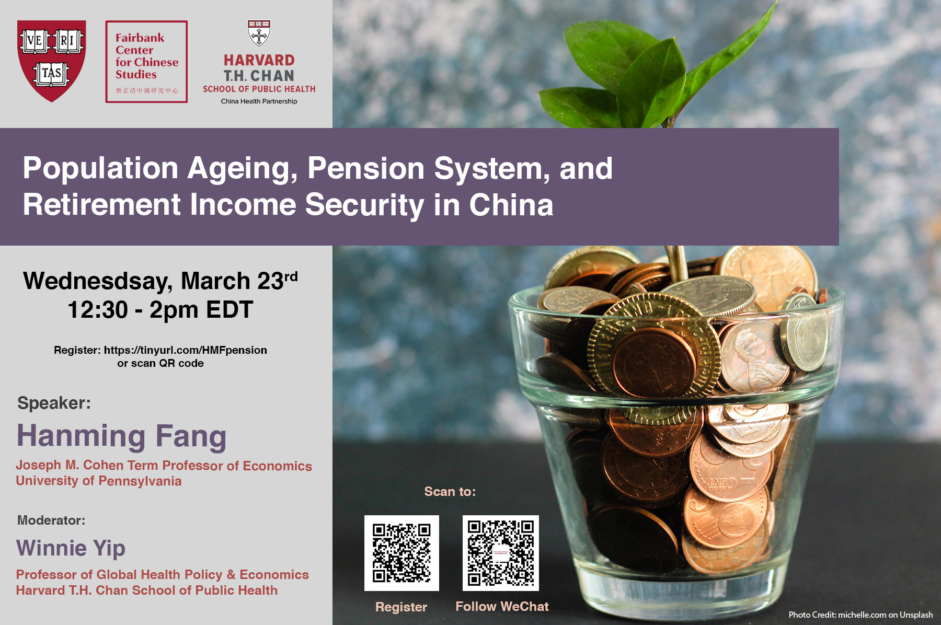Meet Dr. Hao Zhang, Post-Doctoral Research Fellow Part of an occasional series of windows into the lives of researchers on the Harvard China Health Partnership. Why did you become a public health researcher? There was no monumental moment. The decision came rather naturally after alternatives had been eliminated. Growing up, I had a lot of fond memories associated with the healthcare setting, as my mom is a doctor. But she…
Researcher Profile: Xuanyi (Max) Nie
Meet Dr. Xuanyi (“Max”) Nie, Post-Doctoral Research Fellow Part of an occasional series of windows into the lives of researchers on the Harvard China Health Partnership. How did you become interested in researching “medical cities”? I’ve always been interested in how humans interact with complex things. Health care systems constantly pose challenges to us as humans and people respond differently to the constraints of the built environment, thus shaping behavior.…
Healthy Ageing: Societal and Medical Support for the Elderly Population in China
At a Chinese-language event attracting more than 450 participants from across the globe, Dr. Wannian Liang, Executive Vice Dean of the Tsinghua University Vanke School of Public and Former Director of the Department of Institutional Reform of the National Health Commission, joined Harvard’s Dr. Winnie Yip, Professor of Global Health Policy and Economics, and Dr. William Hsiao, K.T. Li Professor of Economics Emeritus, in discussing key challenges and opportunities for…
Continue reading “Healthy Ageing: Societal and Medical Support for the Elderly Population in China”
What Waits Ahead for the Private Health Care Providers in China? (featuring Professor Winnie Yip)
At the 2022 China Conference organized by Harvard Kennedy School’s Greater China Society, Professor Winnie Yip, Director of the Harvard China Health Partnership, discussed the Chinese government’s role in providing access to basic healthcare and opportunities for the private sector to fill additional healthcare needs. She was joined by Antony Leung, Chairman of New Frontier Health and CEO of Nan Fung Group, and Jin Wang, Partner at McKinsey Greater China. Resources A recording…
Population Ageing, Pension System, and Retirement Income Security in China
Dr. Hanming Fang is Joseph M. Cohen Term Professor in Economics at the University of Pennsylvania. He is an applied microeconomist with broad theoretical and empirical interests focusing on public economics, including topics such as discrimination, social insurance, and welfare reform, health insurance markets, and population aging. In 2008, Professor Fang was awarded the 17th Kenneth Arrow Prize by the International Health Economics Association (iHEA) for his research on the sources of advantageous…
Continue reading “Population Ageing, Pension System, and Retirement Income Security in China”
New Publication: Informal Payments and Patients’ Perceptions of the Physician Agency Problem: Evidence from Rural China
Informal payment for medical services is a common phenomenon in China. Patients make informal payments, in cash or in kind, to physicians in addition to official charges billed for medical services. This paper assesses the associations between patients’ perceptions of the physician as an agent for the patient’s interests (physician agency problem) and informal payment behavior. Using data of 24,000 and 6700 rural households respectively from the Health Development of…
Health Philanthropy in China: Report by the Centre for Asian Philanthropy and Society (featuring Professor Winnie Yip)
The Centre for Asian Philanthropy and Society (CAPS) has published a series of China Issue Guides that examine philanthropic activity in China and highlight important information for those interested in giving to the health sector and three other key issue areas. In a chapter HCHP Faculty Director Winnie Yip authored for the CAPS Health Philanthropy report, she discusses the landscape of health care in China, including areas that require more attention…
New Publication: Technology Platforms Are Revolutionizing Health Care Service Delivery in China
In this article, we describe China’s Internet health market and illustrate how technology platforms are revolutionizing health care delivery. We utilize two unique data sources: data from the Internet portals of major four Internet health platforms (extracted using Web-scraping tools), together with billing data from one of the four platforms. While China’s Internet health market encompasses a variety of different health care services and products, we focus our discussion on…
China’s COVID-19 Policy Response
At an LSE event entitled “China and the World in the Post-COVID Era,” Dr. Winnie Yip, Professor of Global Health Policy and Economics, shared her insights on China’s COVID-19 policy response. Dr. Yip highlighted the continued uncertainty that Chinese society–and the world as a whole–faces as a result of COVID and the cautious approach that the government has taken in maintaining its zero-COVID policy. She suggests that the question is not…
New Publication: Understanding online dual practice of public hospital doctors in China: a mixed-methods study
Telemedicine and telehealth hold promise for reducing access barriers, improving quality and containing medical costs. As Internet companies enter the healthcare market, a rising number of online healthcare platforms have emerged worldwide. In some countries like China, public hospital doctors are providing direct-to-consumer telemedicine services on these commercial platforms as independent providers. Such online service provision creates a new form of dual practice, which we refer to as ‘online dual…










